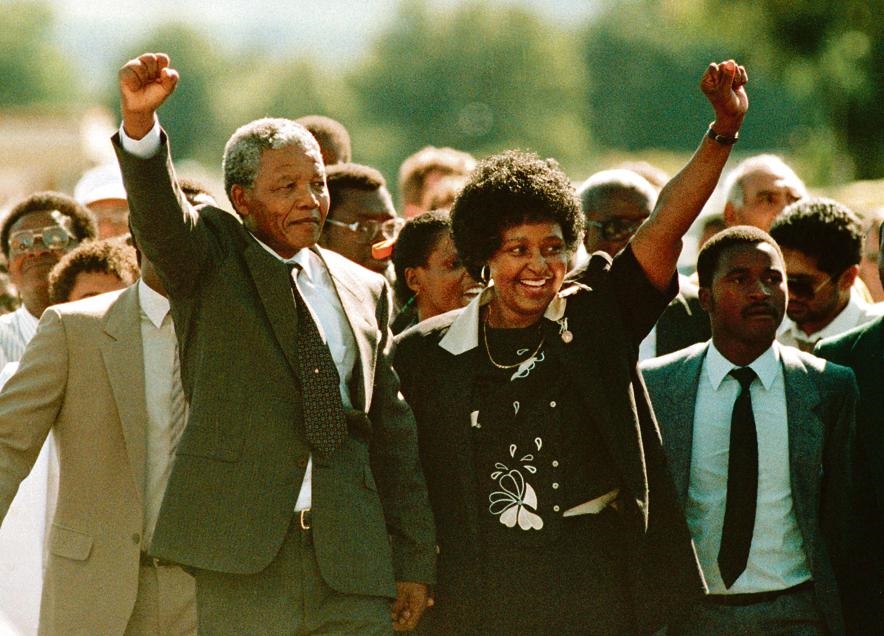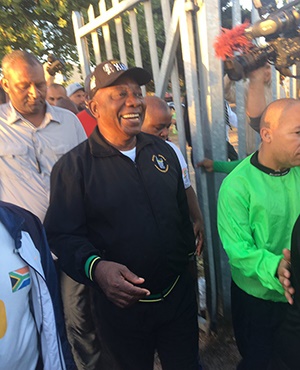Mondli Makhanya: We must not want to be Winnie
CITY PRESS 2018-04-09 00:01
A story that is not often told about the weekend of Nelson Mandela’s
release from prison is the one about the desperate quest to find his
wife the night before he was freed.
When then president FW de
Klerk caught everyone by surprise by announcing Mandela’s release on the
Saturday, there was a scramble to get the leadership of the Mass
Democratic Movement to Cape Town as soon as possible. Funds were quickly
sourced to charter a flight to the Cape so that everyone would be on
the ground to do enough planning to make Madiba’s release on the Sunday
the kind of dignified and historic affair that it should be.
But there was a problem.
Winnie
Mandela, as she was then known, was nowhere to be found. Teams of
comrades scoured Johannesburg into the early hours of the morning in
search of the Mother of the Nation.
When she was eventually found, she was in a not-so-nice location, in not-so-good company and in a not-so-good state of mind.
Even
when the aeroplane arrived in Cape Town, she was still in need of some
good rest so that, by the time she got to Victor Verster Prison, Mandela
would be able to recognise his spouse and be excited to see her.
This
obviously necessitated a delay in when she could be taken to him and,
by extension, when he could eventually walk out of those gates.
And
so the old man twiddled his thumbs, unaware that the frolics of the
person he loved were partially responsible for delaying his freedom.
There
are many who were involved with the logistics of that historic day who
are still angry with her for being partially responsible for the delay
in Mandela getting his first taste of freedom.
They will tell you
that, even if it was a delay of a few hours, every minute must have
felt like ages if you had been inside a prison’s walls for 27 years.
They
knew this behaviour by Winnie Mandela was not out of character. It was
just that, on that day, it had disastrous consequences.
This story is not often told because this not a pleasant narrative.
When
it comes to Winnie Madikizela-Mandela, you can either tell the story of
a saint or the story of a villain – it is never the story of the
complete person.
And so a story such as this one, the story of the coarse Madikizela-Mandela, is not a welcome one.
Let’s start with those who saw her as a villain because they are easily dismissible.
To
this lot, the only frame into which Madikizela-Mandela fitted was the
Moeketsi “Stompie” Seipei kidnapping, the infidelities, the incendiary
rhetoric and the alleged abuse of finances.
To them, she would have been a demon even if she performed a miracle that made a blind man see.
Just
as problematic is the legion of Madikizela-Mandela cultists who refuse
to accept that she was a deeply flawed human being; that she was a
problematic figure in resistance politics and in post-1994 democratic
politics.
In honouring Madikizela-Mandela, we should not overlook
the blemishes on her being. Doing so would be denying our own history
and how, in many ways, she reflected some of the worst flaws of our
damaged society and the ugliness of our bitter history.
Madikizela-Mandela must be praised for emerging from the shadow of her more prominent and powerful husband.
At
the Rivonia Trial in the early 1960s, while the cameras and commentary
focused on her beauty and glamour, Madikizela-Mandela was projecting an
image of courage and indefatigability.
She became the spokesperson for the revolution that the apartheid system was trying to crush.
In
subsequent years – with the leaders of the anti-apartheid movement
either in exile or in prison – she was to emerge as the primary voice of
the anti-apartheid forces.
To the student and scholar movements of the late 60s and 70s, she was a pillar of strength.
She did not succumb to harassment, imprisonment and torture – she just got stronger and more defiant.
This
is why the apartheid government was forced to banish her to the remote
Free State town of Brandfort, a fate as terrible as prison or exile.
And that is where things seem to have gone horribly wrong.
It
was this period that seems to have irreversibly turned her into the
wayward individual she became, a waywardness that many are so
dangerously in denial about.
It is a common human trait to refuse to acknowledge the deficiencies of our leaders and heroes.
This
week, we have seen a deluge of tributes that sought to present her as
an amalgamation of Queen Nzinga, Mother Theresa, Cleopatra and Nandi.
This week, the worship will multiply.
Dare we forget that, in
1989, the leadership of the Mass Democratic Movement publicly distanced
itself from the so-called Mother of the Nation because of the “reign of
terror” that she and her Mandela United Football Club were conducting in
Soweto.
The football club, which was nothing more than her
private vigilante gang and whose only association with soccer was its
kit, had terrorised the township and was almost as feared as the
Jackrollers gang.
Such was the extent of grievance against
Madikizela-Mandela and her thugs that members of the Congress of SA
Students even attempted to burn down the Mandela house.
After numerous attempts to rein her in and put a stop to conduct that undermined the struggle, the leaders had to act.
Accusing
her of abusing the trust and confidence of the people, and falling into
“conflict with various sections of the oppressed people and with the
Mass Democratic Movement as a whole”, the leaders said her practices had
“violated the spirit and ethics” of the movement.
Madikizela-Mandela’s
excommunication by the anti-apartheid movement did not come at the whim
of an individual or individuals who despised her.
An instruction
had already come from the ANC headquarters in Lusaka – on the authority
of no less a person than Oliver Tambo – that her criminal gang should
be disbanded.
But because Madikizela-Mandela was, in her view,
above the ANC and the internal liberation movement, this instruction was
ignored.
This unruly streak had frightened many in liberation circles since Madikizela-Mandela’s return from Brandfort.
Some celebrated this as a rebellion against patriarchy and chauvinism, but it was in fact ungovernability of the highest order.
At
the height of the necklacing phenomenon – which she encouraged with her
matchboxes and tyres speech – she had defied instructions from Lusaka
to withdraw her endorsement of the cruel punishment that was meted out
to suspected traitors.
Madikizela-Mandela was her own movement.
While other leaders worked within structures and subjected themselves to
such inconveniences as attending meetings and being given duties to
perform, Madikizela-Mandela preferred being the star act who headlined
rallies and marches.
The everyday mundanity of organisational work was beneath her.
Mandela’s release in 1990 rescued the errant Winnie from exile. She was back in play.
In 1991, she was voted onto the national executive committee of the unbanned ANC at its first conference in Durban.
At
a time when Nelson Mandela and other senior leaders were navigating the
rugged road to a negotiated settlement, Madikizela-Mandela was one of
the discordant voices in the leadership, and she played to the militant
gallery.
Paradoxically, this proved fortuitous because the
apartheid regime was waging a vicious fight against communities with
death squads and surrogate militias.
Radical voices were needed to keep the spirit of resistance and hope alive.
Knowing the person she was, the internal and external leaders were united on one thing – limiting her power.
In
1991, they succeeded in blocking her from becoming president of the ANC
Women’s League, a position that would have given her power that was
somewhat independent from the mother body.
They tried again in
1993, but they failed dismally. She was again returned to the position
in 1997 – against the wishes of the inner clique.
That same year,
a great effort was made to halt her bid for the deputy presidency of
the ANC at the party’s conference in Mafikeng (now Mahikeng) in North
West.
So determined were the party grandees to prevent her from
taking the number two position that they were even prepared to stomach
the rise of Jacob Zuma, whose corruption and uselessness had already
been evident in exile and in the KwaZulu-Natal government, where he was
serving as an MEC for economic development.
Those sympathetic to
her say these efforts were motivated by the fear of her feminist sway
and the inability of men to tolerate a strong woman.
Nothing could be further from the truth.
The
life and legacy of Winnie Madikizela-Mandela will be debated for
decades to come. She will be canonised by most and demonised by a fringe
minority.
She will be credited with single-handedly keeping the flame of freedom alive in the darkest days of apartheid repression.
Her
courage and resilience will be spoken of in high decibels. She will be
labelled as the most outstanding and the most upstanding among us.
The
biggest mistake we will make is that we will try to understand her in
black and white, as either the object of our affections or a figure of
hate.
We should neither see her as a villain nor a saint.
She was just an ordinary human being whose heart was hardened by suffering and whose soul was numbed by torture.
We should not elevate her to the status of a role model who we should emulate, as many have been doing since her death.
None of us should want to be Winnie Madikizela-Mandela.
If we aim to be contributors to a better nation, we should not try to be the damaged goods that came back from Brandfort.
If
we want to be good leaders in our respective spaces – be it in a
stokvel, corporation, political party or sports club – we should possess
the humility that she so lacked.
And if we want to make a genuine impact on society, we should avoid the temptation of the glory-seeking that defined her.
By all means, let us thank her for the tremendous sacrifices she made, along with her generation of struggle leaders.
But at no point should any of us want to be her replica.
Mondli Makhanya is Editor-In-Chief of City Press




